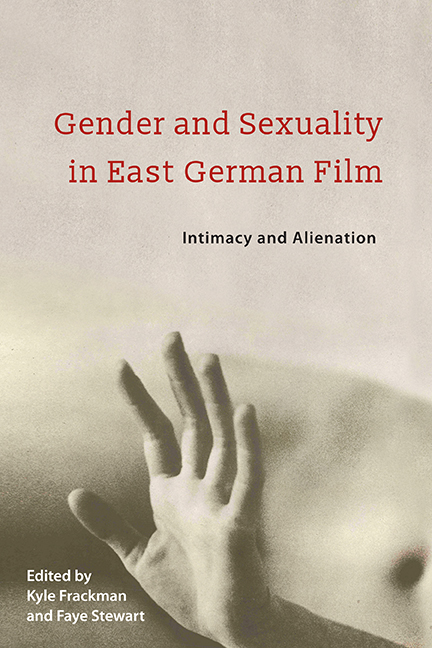Book contents
- Frontmatter
- Contents
- Acknowledgments
- List of Abbreviations
- Introduction: Sex and Socialism in East German Cinema
- 1 Hypnagogic Mothers: Gender, Amateur Film Labor, and the Transmissive Materiality of the Maternal Body
- 2 Powerless Heroines: Gender and Agency in DEFA Films of the 1960s and 1970s
- 3 Jutta Hoffmann and the Dialectics of Happiness: A Socialist Star in Close-Up
- 4 Who Is the “Third”? Homosociality and Queer Desire in Der Dritte
- 5 Volatile Intimacies and Queer Polyamory in GDR Film
- 6 Interracial Romance, Taboo, and Desire in the Eastern Counter-Western Blutsbrüder
- 7 The Desire to Be Desired? Solo Sunny as Socialist Woman's Film
- 8 Ambivalent Sexism: Gender, Space, Nation, and Renunciation in Unser kurzes Leben
- 9 Dealing with Cancer, Dealing with Love: Gender, Relationships, and the GDR Medical System in Lothar Warneke's Die Beunruhigung
- 10 Reimagining Woman: The Early Shorts of Helke Misselwitz
- 11 Shame and Love: East German Homosexuality Goes to the Movies
- 12 Gendered Spectacle: The Liberated Gaze in the DEFA Film Der Strass
- Notes on the Contributors
- Index
10 - Reimagining Woman: The Early Shorts of Helke Misselwitz
Published online by Cambridge University Press: 16 May 2018
- Frontmatter
- Contents
- Acknowledgments
- List of Abbreviations
- Introduction: Sex and Socialism in East German Cinema
- 1 Hypnagogic Mothers: Gender, Amateur Film Labor, and the Transmissive Materiality of the Maternal Body
- 2 Powerless Heroines: Gender and Agency in DEFA Films of the 1960s and 1970s
- 3 Jutta Hoffmann and the Dialectics of Happiness: A Socialist Star in Close-Up
- 4 Who Is the “Third”? Homosociality and Queer Desire in Der Dritte
- 5 Volatile Intimacies and Queer Polyamory in GDR Film
- 6 Interracial Romance, Taboo, and Desire in the Eastern Counter-Western Blutsbrüder
- 7 The Desire to Be Desired? Solo Sunny as Socialist Woman's Film
- 8 Ambivalent Sexism: Gender, Space, Nation, and Renunciation in Unser kurzes Leben
- 9 Dealing with Cancer, Dealing with Love: Gender, Relationships, and the GDR Medical System in Lothar Warneke's Die Beunruhigung
- 10 Reimagining Woman: The Early Shorts of Helke Misselwitz
- 11 Shame and Love: East German Homosexuality Goes to the Movies
- 12 Gendered Spectacle: The Liberated Gaze in the DEFA Film Der Strass
- Notes on the Contributors
- Index
Summary
Such is photography: it cannot say what it lets us see.
—Roland Barthes, Camera LucidaJeder Schmerz konnte als Symbol fur unseren Schmerz herhalten. Das Ungenugen am Erlaubten war in den achtziger Jahren so drangend geworden, so allgegenwartig, das die Geste der Sehnsucht zuweilen von der larmoyanten Attitude kaum mehr zu unterscheiden war. Was mich heute an Helke Misselwitz’ Film uberrascht, ist deshalb, das er eine Distanz zu dem der DDR eigentumlichen Kummer findet. Nicht das—damals inkriminierte—Bild des Schiffs, das weit drausen fahrt, ist so bahnbrechend, sondern der Schwung, mit dem die Sehnsuchtsbilder in den Papierkorb fliegen. Tageslicht! Das Schiff tutet wie das Zeichen eines Entschlusses, endlich den eigenen Kummer zu wenden. “Fur die Frau hat sich nichts verandert.” Die Frau hat sich verandert.
[Any pain could be used as a symbol for our pain. The dissatisfaction about what was permissible had become so pressing in the 1980s, so ever present, that the gesture of longing was at times difficult to differentiate from a self-pitying attitude. What surprises me today about Helke Misselwitz's film is that she finds a distance to the grief that was so particular to the GDR. It was not the image of the ship that was so provocative at the time, but the energy with which those images of longing are flung into the wastebasket. Daylight! The ship is honking as a symbol of a decision to finally overcome the personal grief. “For the woman, nothing has changed.” The woman has changed.]
ULRIKE GRAMANN'S Surprise at re-viewing a short film from 1985 by Helke Misselwitz stresses the author's own locatedness as a viewer. In the GDR of the 1980s, Misselwitz's short film TangoTraum (TangoDream, 1985) was widely perceived as an expression of longing for travel and desire to escape the increasingly stifling atmosphere of late socialism. Certainly GDR censors agreed with such a reading and demanded to eliminate the final image, a giant ocean liner cruising across the screen. When Gramann encountered the film again fifteen years later at a retrospective in Oberhausen, she perceived less the grief over unattainable destinations than the decisive energy that swept such longings— literally—off the table. Gramann's verdict—“‘For the woman nothing has changed.’
- Type
- Chapter
- Information
- Gender and Sexuality in East German FilmIntimacy and Alienation, pp. 204 - 224Publisher: Boydell & BrewerPrint publication year: 2018



